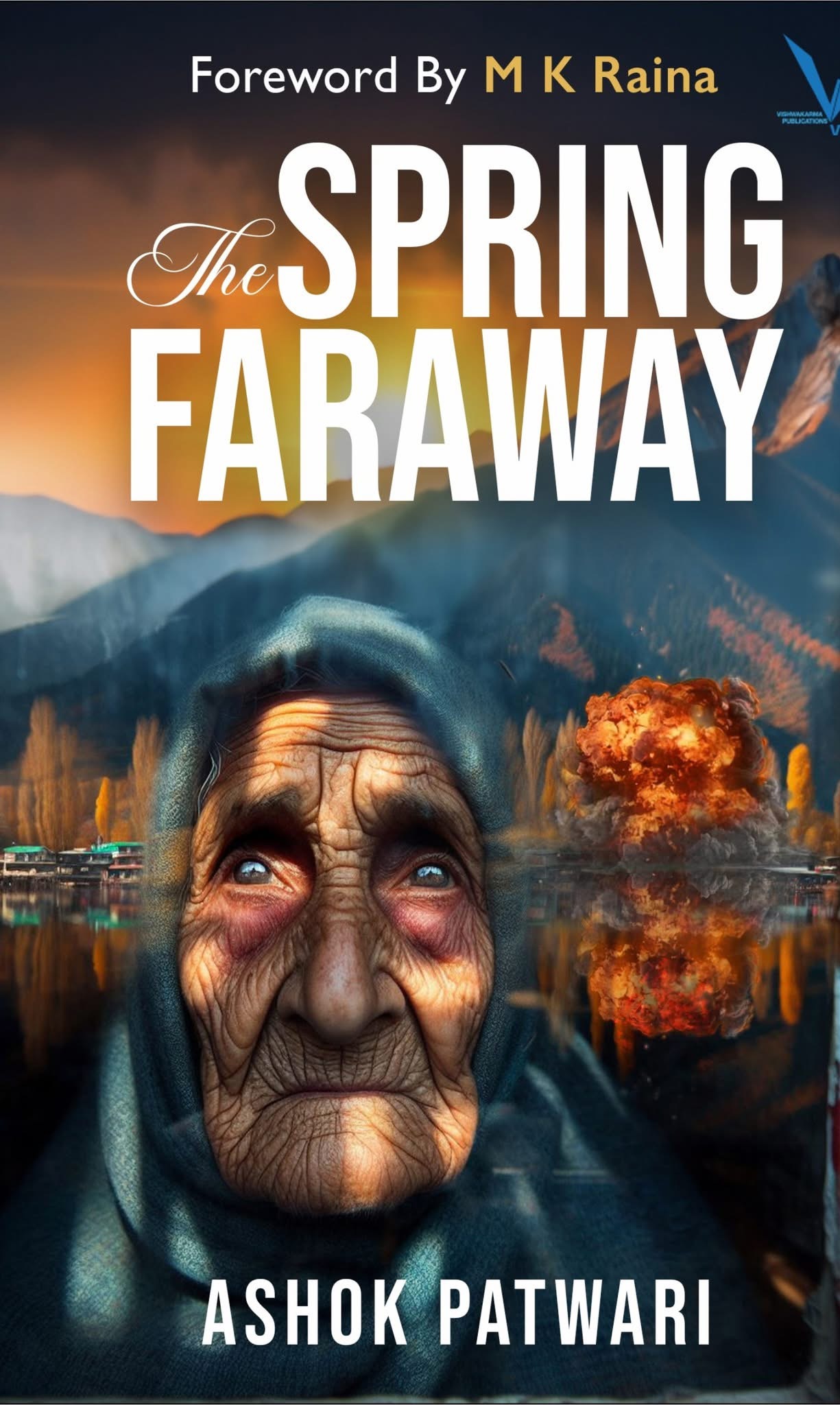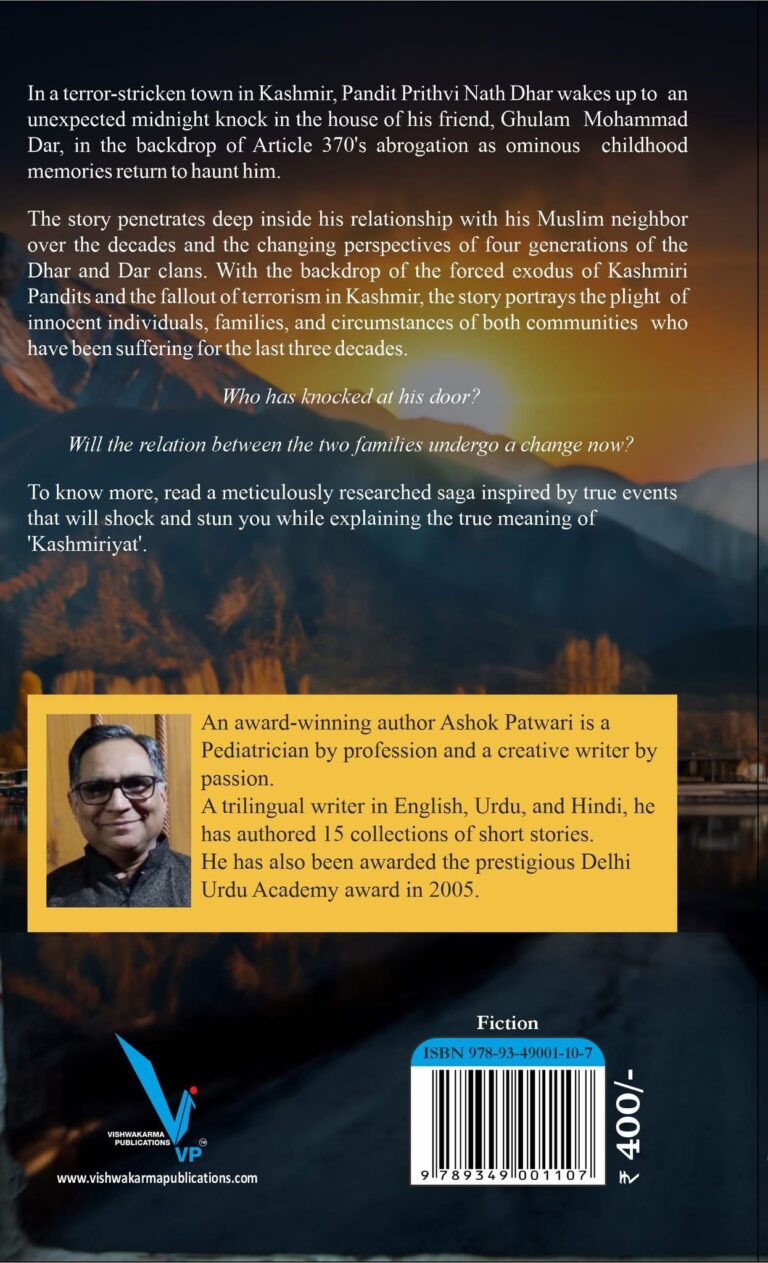
The Spring Faraway – A saga of kashmiriyat
Book Review
At a time when postmodernism dominates the cultural landscape and humanity faces an existential crisis, it feels both necessary and difficult to engage with yet another work on Kashmir that centers on the now-familiar theme of exodus. The Spring Faraway is a thoughtful addition to the limited but significant literature on Kashmir. It offers an honest portrayal of a land scarred by conflict, where loss seems endless and healing remains distant. It is a story of broken faith, trust, and innocence. Ashok Patwari, the author, remains true to his creative purpose. He avoids political correctness and speaks with rare clarity-neither aligning with the right nor the left.
The novel traces the threads of historical upheaval in Kashmir, pointing to the enduring consequences of the Two-Nation Theory and its religious divide. At its core, the Kashmir conflict is not just a political crisis but a deeply human tragedy, especially for the Kashmiri Pandit community, whose contributions are woven into the valley’s cultural fabric. It is a loss of values and a dismantling of a shared heritage that once transcended identities. Through characters like Surinder and Roshan, the novel explores the internal contradictions within the Pandit community—its hesitations, misjudgments, and misplaced trust in the Indian state’s protection. The character of Roshan, in particular, reflects a kind of naïve optimism that mirrors broader systemic failures in both Kashmir and India. The Dhars, Dars, Prithvi Naths, Aziz Joos, Ghulam Mohamads, Razdans, Suris, and others emerge as fading figures—reduced to fragments of memory, waiting to be rediscovered by future generations, long after the urgency of these events has passed.
As with any society that gives way to fundamentalism, Kashmir has seen the suppression of its diverse identities and the silencing of voices once central to its character. These losses are not easily reversed. The novel also suggests that Kashmiri Muslims may one day reckon with the consequences of turning toward extremism. The violence that followed feels foreign to their cultural instincts, and the cost of this betrayal may prove long-lasting.
Unlike many works that hesitate to confront uncomfortable truths, this novel presents a clear and grounded view of what happened—and what was lost. Patwari writes not just as an observer but as someone who has lived through the events he describes.
The characters of Fauzia and Azma give voice to the suffering of women- quiet, enduring, and often overlooked. Their experiences speak to a deeper vulnerability in the valley, where the loss of dignity and security is shared across communities and experiences.
While The Spring Faraway moves at a slower pace and avoids dramatic turns, it still resonates. Compared to Leon Uris’s Exodus, which holds out the hope of a new beginning, Patwari’s work offers a quieter, more sobering view of history—one where resolution remains distant, and memory itself becomes a form of resistance.
Having researched comprehensively on the “Literature in Exile” and presented a paper in this connection, The Spring Faraway belongs to a different category altogether. It’s treatment of a historical upheaval combines the ages, the nuances of its characters which require a thorough assessment and literary interpretations. It certainly is not the run-of-the-mill stuff, unlike most of the literature in exile. The book has even shades of Arvind Gigoo’s ‘Ugly Kashmir’, which the author must have certainly arrived at independently.
THE SPRING FARAWAY – A SAGA OF KASHMIRIYAT
Author: Ashok Patwari
Pages: 272 (Paperback)
ISBN: 978-93-49001-10-7
Publisher: Vishwakarma Publications, Pune
Year of Publication:2025
Available widely on Amazon (UK, Germany, France, Spain, The Netherlands and Portugal)

Kanwal Krishan Lidhoo
Kanwal Krishan Lidhoo is a distinguished Broadcaster, Author, and acclaimed Translator recognized by the Sahitya Akademi, New Delhi. He is the Founding Director of the Kashmir Rechords Foundation, a digital humanities initiative focused on the collection, preservation, and dissemination of Kashmir’s cultural, linguistic, and intellectual heritage.


